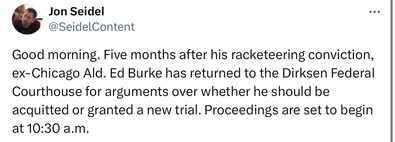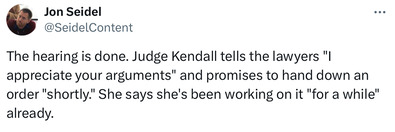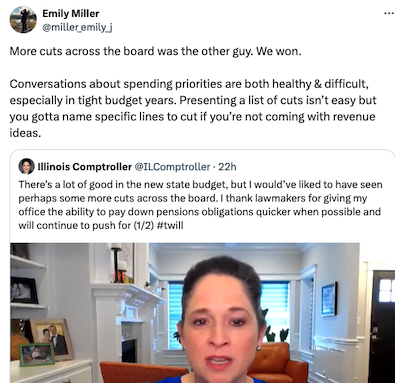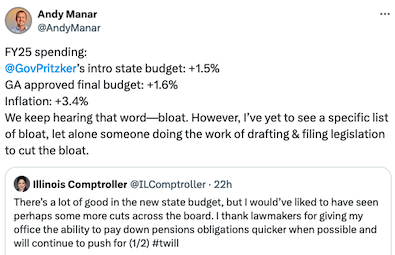|
Isabel’s afternoon roundup
Wednesday, Jun 5, 2024 - Posted by Isabel Miller * Jon Seidel’s thread on Ex-Ald. Ed Burke’s bid for acquittal or a new trial…   Burke’s sentencing is set for June 24. * In case you missed it…
* WCIA | Governor J.B. Pritzker signs budget: “Overall, our fiscal foundation is getting stronger every year,” Pritzker said Wednesday. The governor was joined by legislative leaders Illinois Speaker of the House Chris Welch (D-Westchester) and Illinois Senate President Don Harmon (D-Oak Park). Also in attendance was Lieutenant Governor Julianna Stratton and chief budgeteers Rep. Jehan Gordon Booth (D-Peoria) and Sen. Elgie Sims (D-Chicago). * NBC Chicago | 3 key components of Illinois’ budget as Pritzker signs legislation: Among the three key components of the bill was to eliminate the state’s 1% tax on groceries, which is paid out to municipalities. The tax is levied on all items “meant to be consumed off the premises where they are sold,” and according to text of the bill will be eliminated on Jan. 1, 2026. “If it reduces inflation for families from 4% to 3%, even if it only puts a few hundred bucks back in families’ pockets, it’s the right thing to do,” [Pritzker said] said. * Center Square | Bill allows Illinois local government to get loans from state climate bank: A measure ready to be sent to Gov. J.B. Pritzker would allow local governments to apply for loans through the Illinois Finance Authority Climate Bank in an effort to expand so-called “green energy” infrastructure across the state. State Sen. Rachel Ventura, D-Joliet, advanced Senate Bill 3597, which would allow local governments to apply for loans through the Illinois Finance Authority Climate Bank for projects including solar power installations. * WCIA | Illinois state parks face off in fundraising competition: A competitive fundraising effort is underway for Illinois state parks. Throughout June, every donated dollar will equal one “vote” towards your favorite parks. […] Illinois is one of only seven states that do not require an entrance fee for state parks. Officials say donations help make this possible. * Streetsblog | At 2nd People’s Lobby Transit Town Hall, politicians and riders discussed how to create a world-class system: The panel of elected officials concerned with transit at the event included State Representative Kam Buckner (D-26th), who has introduced several bills designed to improve transportation in the Chicago region. “What I’ll just say about a transit system that works for the people is that it’s a system that’s irresistible,” he said. “I mean, the system where it makes way more sense for you to get on the Green Line, or the Jeffery Jump than it does to get in a car or call an Uber. This is, to me, not just about buses and trains. This is about mobility, and mobility is a human right.” * Block Club | Not All Peaceful Protests Constitutionally Protected, Police Chief Says Ahead Of DNC: Police Supt. Larry Snelling warned organizers that not all peaceful protests are protected by the First Amendment ahead of August’s Democratic National Convention in Chicago, drawing immediate criticism from local civil liberties groups. “First Amendment protection is only there if you’re not committing a crime, and you can be acting out peacefully but still breaking the law,” Snelling said at a press conference Tuesday to discuss safety at the political convention. * Sun-Times | 4 Chicago police officers face dismissal for allegedly stealing cash and drugs, lying about gun seizures: Officers Daniel Fair, Jeffery Morrow, Kevin Taylor and Rupert Collins are accused of engaging in misconduct the Civilian Office of Police Accountability deemed “substantial and irrefutable.” In one case, Fair and Taylor took cash and marijuana during a vehicle search, COPA said in a report dated Jan. 26. GPS records show they drove to Fair’s block after the search and the contraband was never inventoried. * Block Club | Homeless Residents Relocated In Humboldt Park For Fest Season: On Tuesday, people living in 12 tents at the central and south ends of the park were moved to the north end near North Avenue, where there was already a cluster of at least 30 tents. City officials, Park District staff, Ald. Jessie Fuentes’ (26th) office and Chicago Union of the Homeless volunteers helped relocate people’s tents and belongings, officials said. The move was to make room on the southern end of the park for the Puerto Rican Festival and Parade this weekend and to “streamline the process of serving and connecting our unhoused neighbors with housing services” in closer proximity, Fuentes said in a release. * WBEZ | The transfixing, cathartic experience of rocking out in a Chicago cemetery: When Kim Gordon comes to Chicago on Saturday to perform songs off her new record The Collective, she won’t be appearing at Metro or the Riviera or even a summer music festival. Instead the iconic former leader of Sonic Youth, now two albums into an acclaimed solo career, is performing in a cemetery. In front of a mausoleum. Surrounded by 1,500 adoring and utterly alive fans. * Tribune | WNBA rescinds 2nd technical foul on Angel Reese after Chicago Sky rookie’s ejection during loss: Coach Teresa Weatherspoon said the officiating crew declined to explain the decision to the Sky coaching staff. “I tried to get an explanation and I did not,” Weatherspoon said during her postgame news conference. “I don’t know at this moment what has happened.” * Daily Herald | ‘Unprecedented demand’: Proposed 160-acre data center would be the largest in Lake County: Based on a rough estimate of construction costs, the T5 proposal when built out would represent an investment of $2.25 billion or more, according to Richard Gatto, executive vice president of the Alter Group. […] “Demand for data centers is incredibly high with the rapid evolution and integration of AI (artificial intelligence) into all aspects of business operations,” explained Ron Lanz, business development director for Lake County Partners, the county’s economic development arm. * Aurora Beacon-News | Pay increased for many elected county offices in Kane County: In a split vote on May 29, the Kane County Board approved an increase in pay for four elected positions — circuit clerk, recorder, auditor and coroner — to $109,242, with 2% yearly increases for the following three years. This will equalize the positions’ salaries, which previously varied by around $2,000, and will match the current salaries for the treasurer and county clerk, which were set in 2022. * Daily Herald | Hundreds of acres in Huntley to become Kane County forest preserve — but some land set aside for development:: Hundreds of acres of open land in Huntley could soon become a Kane County forest preserve, though the village has asked that some of the property be set aside for future development. The potential new forest preserve, southwest of where Route 47 meets Interstate 90, would consist of a shelter and trail looping around the property, in addition to parking, Kane County Forest Preserve District Executive Director Ben Haberthur said. * SJ-R | Vietnam War veteran, proponent of veterans issues around Lincoln and central Illinois dies: Joe Schaler, a U.S. Marine who served in the Vietnam War and championed veterans issues in the Lincoln, Ill., area after moving there in 2005, died May 29. […] Schaler was one of the proponents of and later chaired the Veterans Assistance Commission, which assists with individual Veterans Administration claims and points veterans in the direction of VA benefits, including job-training programs. The Commission also helps veterans and their families with short-term emergency assistance. * Reuters | World hits streak of record temperatures as UN warns of ‘climate hell’: Speaking about the findings, U.N. Secretary-General António Guterres emphasized how quickly the world was heading in the wrong direction and away from stabilizing its climate system. “In 2015, the chance of such a breach was near zero,” Guterres said in a speech marking World Environment Day. With time running out to reverse course, Guterres urged a 30% cut in global fossil fuel production and use by 2030.
|
|
Pritzker on federal money, next year, transit fiscal cliff, Mendoza, Crespo, pensions, historic preservation
Wednesday, Jun 5, 2024 - Posted by Rich Miller * Gov. Pritzker was asked today after he signed the budget if the budget process next year will be more difficult…
Please pardon all transcription errors. * Another question about next year…
* Background is here if you need it. Regarding Mendoza…
* Background on this question is here if you need it…
The governor undoubtedly knows that the budgeteer process doesn’t allow people like Rep. Crespo to pitch the governor about budget matters. Everything has to go through the budgeteers and the respective leaders. And Crespo told me today that he did present his ideas to his budgeteer. Click here to see Rep. Crespo’s actual proposal. * On to pensions…
* Historic preservation…
|
|
Budget signing react
Wednesday, Jun 5, 2024 - Posted by Rich Miller
Click here and scroll to the bottom for links to the walkdown and the highlights. * SGOPs…
* US Rep. Mary Miller had a similar take…
* Sen. Sims…
* Arne Duncan at CRED…
More budget statements have already been posted on our press release live feed, and I’ll post new releases there as they come in.
|
|
C’mon, people
Wednesday, Jun 5, 2024 - Posted by Rich Miller * Capitol News Illinois…
Yeah, they’re gonna leave all that money behind. But if they do, then what happens, other than maybe we don’t have to watch their endless TV ads on local stations? They basically don’t directly employ anyone in Illinois aside from lobbyists, so layoffs wouldn’t be a problem, except for the lobbyists. But they’re some of the most resilient people I know. And if they did leave Illinois, the smaller operators could expand and/or rush in to fill the void. One thing those two huge companies definitely don’t want to see is the smaller operators gaining a foothold anywhere. If that happened, the smaller outfits might build up strength and then expand into other states, which could damage the sportsbook duopoly. * And the Illinois tax increase is definitely tilted in favor of the smaller companies. Center Square…
Wait, what? Now somebody is saying that the smaller operators are gonna leave? Which is it? * As we’ve discussed before, perhaps the biggest issue here is tax “contagion.” Some other states have kept their tax rates low, so they’ll likely look at what happens in Illinois…
|
|
Uber Partners With Cities To Expand Urban Transportation
Wednesday, Jun 5, 2024 - Posted by Advertising Department [The following is a paid advertisement.] Uber is leading the charge to close critical transportation gaps, ensuring reliable access to its services in places that need it most, such as underserved areas like Englewood. This is a part of Uber’s broader commitment to augment and expand the reach of Chicago’s transportation ecosystem, focusing on overcoming the first-mile/ last-mile hurdles that have long plagued residents in farther afield neighborhoods. Uber aims to extend the public transit network’s reach, making urban transportation more accessible and efficient for everyone. Discover the full story on how Uber is transforming city transportation for the better.
|
|
Protected: SUBSCRIBERS ONLY - Fundraiser list
Wednesday, Jun 5, 2024 - Posted by Rich Miller
|
|
Figure it out
Wednesday, Jun 5, 2024 - Posted by Rich Miller * Mike Miletich…
* Press release…
* The same group sent out this release after the bill was approved in the Senate…
Some legit business owners were worried the legislation could put them out of business. It apparently needed more time to percolate. * But while the legislation is percolating, things are advancing on the ground. “That’s a barrel of smokable hemp being sold at a trade show in Rosemont,” said a friend who sent me this pic yesterday…  People could buy it by the pound…  * Fox32…
Lovely.
|
|
Governor, top officials go after Comptroller Mendoza
Wednesday, Jun 5, 2024 - Posted by Rich Miller * I told subscribers about this earlier, so I’ll just leave these here for y’all. Let’s start with the comptroller…
* The governor’s policy/legislative person was not amused…  * And neither was the Deputy Governor for Budget & Economy…  The full story, entitled “Illinois comptroller pleased with ‘vanilla’ budget,” is here…
* Meanwhile, Capitol News Illinois’ newsletter went out after I’d finished writing, but take a look at this…
Thoughts?
|
|
Open thread
Wednesday, Jun 5, 2024 - Posted by Isabel Miller * What’s going on? Keep it Illinois-centric please…
|
|
Isabel’s morning briefing
Wednesday, Jun 5, 2024 - Posted by Isabel Miller * ICYMI: How Illinois’ hands-off approach to homeschooling leaves children at risk. ProPublica…
- Educational officials say this lack of regulation allows parents to pull vulnerable children from public schools then not provide any education for them. - No oversight also means children schooled at home lose the protections schools provide, including teachers, counselors, coaches and bus drivers — school personnel legally bound to report suspected child abuse and neglect. At 11 Governor Pritzker will sign the FY25 state budget. At 4:30 the governor will participate in fireside chat at Social Innovation Summit. Click here to watch. * Tribune | For special education students, transitional schools bridge the gap between high school and full-time employment: Under Illinois state law, students with significant cognitive disabilities are entitled to up to four years of continued education at what are known as “transitional schools” after their traditional four years in high school, up until they turn 22 years old. But for special education graduates, transitional schools like Southside can provide a bridge from school to the workforce through specialized instruction, social-emotional learning and opportunities to complete paid work at Chicago companies throughout the school year. * Journal & Topics | Democratic Township Leaders Expected To Fill 53rd State House Seat Wednesday: The open appointment meeting is scheduled for 6 p.m. Wednesday, June 5 in Meeting Room A of the Mount Prospect Public Library, 10 S. Emerson St. Those wishing to attend are asked to send an RSVP via email to ElkGroveTownshipDemocrats@gmail.com. * WAND | Pritzker, advocates hope House passes hemp regulation proposal during veto session: “There’s no restriction on who gets it, how much they get, etc,” Pritzker said. “So, I really believe that we need to step back and ask what is in the best interest of the health of kids and adults across the state. I think regulating it is proper.” * WTTW | From Gun Control to Public Transit Rescue, A Look at What Didn’t Pass the Illinois General Assembly This Spring: Advocates who say lives are on the line are hoping Karina’s Bill — named in honor of a Chicago mother shot and killed after getting an order of protection from her abuser — will have a chance come fall. A judge who grants an order of protection can revoke an abusers’ Firearm Owners Identification card, meaning the individual can no longer legally have a gun. But that doesn’t mean that person actually gives up their firearms. * WRAM | Farm Family Preservation Act Not Included in Illinois’ Passed Budget: Last week, Illinois legislature passed a $53.1 billion state budget. One priority for the Illinois Farm Bureau that was not included in the budget was the Farm Family Preservation Act. Warren-Henderson Farm Bureau Manager Ashlyn Quinn explains: “The Farm Family Preservation Act, which is the estate tax law that was going to help increase that, which is so vital for all farm families to have that passed. We did make it all the way to final negotiations on that, but unfortunately it did not get included. So, right now it is sitting at $4 million, this would raise it to $6 million. It did also change it so that it was an exemption and not a threshold, so only those dollars over the $6 million would be taxed, as opposed to right now where the entire estate is taxed if the threshold is reached. It does tie the $6 million exemption to inflation. We were told it is not a no, it is just a not right now.” * WSIU | Inaugural Illinois Manufacturing Hall of Fame inductees announced: The Illinois Manufacturers’ Association has announced the inaugural class of inductees into the Illinois Manufacturing Hall of Fame, which recognizes the people, products and companies that have made a substantial and indelible impact on manufacturing in Illinois. The inductees include Abraham Lincoln: The first and only U.S. President with a patent; Lincoln Logs; the cell phone; Cracker Jack; Caterpillar and the University of Illinois system. * PJ Star | Here’s why it could be a bad summer for disease-spreading ticks in Illinois: Experts have suggested Illinois may be seeing more and earlier tick activity. “We’re seeing less severe winters, which might lead to more ticks,” Maureen Murray, assistant director of the Urban Wildlife Institute at Lincoln Park Zoo, recently told the Chicago Tribune. “Fewer ticks die during the winter, and ticks can be active sooner in the spring, just because it warms up faster.” * AP | Chicago police tweak mass arrests policy ahead of Democratic National Convention: Chicago police have received fresh de-escalation training, while about 3,000 officers are undergoing specialized training to “respond directly to civil unrest and the possibility of riots,” according to Snelling. Proposed changes to the way police deal with mass arrests, which are still being finalized, include more supervisor review onsite and debriefings afterward to see what worked and what didn’t. * Tribune | Lawyers for ex-Ald. Ed Burke to make in-person pitch to toss corruption conviction: Six months after ex-Chicago Ald. Edward Burke’s landmark corruption conviction, his lawyers will be back in court Wednesday in a long-shot bid for a retrial on some counts and an outright acquittal on others. […] Burke is scheduled to be sentenced June 24. Before that, however, U.S. District Judge Virginia Kendall must deal with a motion by Burke’s attorneys to toss out the jury’s decision and acquit the former alderman on almost all counts. * Sun-Times | Loop’s safety and hospitality ‘ambassadors’ program expands for summer: The advocacy group Chicago Loop Alliance is expanding its ambassadors safety and hospitality program starting this week to the central Loop — beyond its normal focus on State Street — for four months through the busy summer tourism and festival season and the Democratic National Convention in August. Unarmed paid ambassadors wearing yellow and black uniforms are trained in de-escalation tactics and help prevent violence, illegal activity and “unwanted behavior.” * CBS Chicago | DCFS stops sending children to Chicago center after abuse allegations: The Illinois Department of Children and Family Services said it stopped sending kids in its care to a center in Chicago earlier this year after two workers there were accused of abuse. The men accused worked at Aunt Martha’s, a temporary care center with a facility for foster children on South Michigan Avenue. CBS 2 learned one of the workers has been charged with sexual abuse and another was on the run. * Tribune | Why are so many Chicago medical residents unionizing? Activity follows pandemic, shifting attitudes: Thousands of residents and fellows in the Chicago area have voted to unionize in the last year — at University of Chicago Medicine in May, Northwestern Medicine in January and West Suburban Medical Center in Oak Park in November. University of Illinois at Chicago residents and fellows unionized in 2021. Residents have long had to work many hours for relatively low pay, as they train to become specific types of physicians after medical school. Traditionally, residents have been expected to put their heads down and grind, for years, as they gain on-the-job experience and progress toward more lucrative, prominent careers. * Tribune | Kevin Warren presses ahead on Bears stadium pitch as Johnson, Pritzker stay quiet on the subject: The Chicago Bears’ bid for billions of dollars in public assistance to build a new lakefront stadium was the elephant on the agenda Tuesday at the Chicagoland Chamber of Commerce’s annual meeting. With a crowd of high-powered business leaders watching, Bears President and CEO Kevin Warren repeated his pitch for the new domed stadium in a keynote address. He presented the stadium as a surefire growth starter for downtown Chicago. * Daily Southtown | Republican walk out prevents Will County vote on raises for elected officials: The Will County Board did not vote on pay raises for county elected officials Tuesday after Republicans left the board room in the middle of a special meeting, resulting in no quorum to conduct official business. Because votes were not taken, countywide elected officials and board members who are up for election in November will have their salaries unchanged for the next four years. * SJ-R | ‘This is ultimately to make everyone safer.’ Massage parlors will have to register with city: The ordinance, crafted after one adopted by the Village of Chatham several years ago, also mandates proof of State of Illinois licensure of the parlor’s massage therapists. “This is ultimately to make everyone safer: people who do massages, people who go in for massages and the neighborhoods where the massage establishments exist,” insisted Ald. Jennifer Notariano, who has a number of the parlors in her inner-city Ward 6. * Pontiac Daiy Leader | Primary winner in state’s 53rd Senate District has eyes on November, ears on residents: Unless there’s a write-in candidate or the Democrats make an effort to get a name on the ballot, Chris Balkema of Channahon, winner of the Republican primary in March will be the next state senator to represent the Pontiac area in Springfield. Balkema won the primary with nearly 50% of the vote. His opponents were Jesse Faber of Pontiac, Mike Kirkton of rural Gridley and Susan Wynn Bence of Watseka.
|
|
Protected: SUBSCRIBERS ONLY - Today’s edition of Capitol Fax
Wednesday, Jun 5, 2024 - Posted by Rich Miller
|
|
Selected press releases (Live updates)
Wednesday, Jun 5, 2024 - Posted by Rich Miller
|
|
Live coverage
Wednesday, Jun 5, 2024 - Posted by Rich Miller * You can click here or here to follow breaking news. It’s the best we can do unless or until Twitter gets its act together.
|
| « NEWER POSTS | PREVIOUS POSTS » |

















